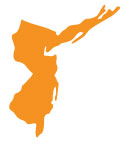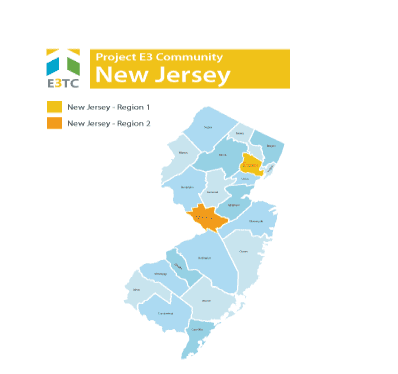New Jersey was chosen as a targeted community through the Vocational Rehabilitation Technical Assistance Center: Targeted Communities (VR-TAC-TC) or Project E3. Project E3 partnered with State VR Agencies and local community partners to improve outreach and employment-related services to underserved people with disabilities in this community.

New Jersey, also known as “The Garden State”, is among the leaders in many types of agricultural production. The state is a peninsula, bordered by the Atlantic Ocean in the east, southeast, and south. New Jersey is the fourth smallest state in area and the 11th most populous of the 50 states. The geographic location and factories in cities helped to drive the Industrial Revolution. Today, New Jersey is one of the most ethically and religiously diverse states in the country.
With a median household income of $76,126 in 2016, well above the national average, and a poverty rate of about 10 percent, New Jersey is the second-wealthiest state in the country. In spite of this, large populations in New Jersey experience unemployment rates higher than the national average and median household incomes far below the federal poverty level.
Targeted Communities
The state-federal vocational rehabilitation system in New Jersey faced many challenges as it strove to serve people with significant disabilities and promote competitive integrated employment. Project E3 provided intensive technical assistance to two regions in New Jersey:

Key Information:
Children
Live in households that received Supplemental Security Income, food assistance, or cash public assistance through the Temporary Assistance for Needy Families (TANF). National rate = 28%
Receiving SSI
National rate = 4.0%
VR Case Closure
State rate = 30.5%
Unemployment
National rate = 4.3%
Poverty Rate
National rate = 13.5%
Targeted Populations
Within the targeted communities, Project E3 focused on improving vocational rehabilitation service outcomes for these populations:
These populations were characterized as:
Primary Challenges for Targeted Populations
The combination of the challenges above and other factors created significant barriers for persons with disabilities living in New Jersey, including:
Key Strategies to Address Barriers
Following are some of the key strategies developed and implemented to address the targeted populations' challenges and barriers to employment.
Community Based Participatory Research (CBPR): To understand a community’s issues and concerns, one needs data and information both supplied by common data sources and interpreted by the community to better understand their issues and possible solutions to those issues. CBPR’s methodology is predicated on deep and extensive community involvement in the identification of issues and concerns and in the resolution of those issues and concerns.
Poverty and Disability: Bridges Out of Poverty – It is difficult for many individuals including professionals in the field to understand the extent of challenges facing individuals living in poverty and trying to work their way out of poverty. “Bridges Out of Poverty” is excellent training on cultural responsiveness for working with people and communities that experience poverty. It is a proprietary training program so for more information click on this link: aha! Process - Poverty Reduction Professional Development and Solutions (ahaprocess.com
Trauma Informed Care: New Jersey identified this as a needed strategy for adding expertise to their counseling approaches. New Jersey VR, Workforce, Independent Living Centers and community providers attended a remote training. After receiving training, training participants discussed ways to apply in their daily work as well as sustain TIC going forward.
Community Outreach and Orientation: Community buy-in and support needs constant attention as community members change and new members are added. George Washington University actively engaged Vocational Rehabilitation, community partners, Workforce agencies and Independent Living Centers and Social Services in the targeted communities in regular meetings to discuss progress, accomplishments and methods for sustaining the outreach and collaboration when the E3 grant ended.
New Jersey Overview PowerPoint Presentation
Project Outcomes
Project E3 provided New Jersey’s state Vocational Rehabilitation agencies and their partners with the skills and competencies needed to effectively and efficiently address barriers to competitive integrated employment and community integration encountered by persons with disabilities in these regions.
Our specific goals for this project were to:
We will leverage promising practices, knowledge, and experience gained from this project to expand employment opportunities for individuals with disabilities from underserved and economically disadvantaged populations throughout New Jersey and across the United States.
More Information
For further information about the New Jersey community activities:

Maureen McGuire-Kuletz Ed.D., CRC
Co-Director, Center for Rehabilitation Counseling Research & Education
Associate Professor, Rehabilitation Counseling
mkuletz@gwu.edu


